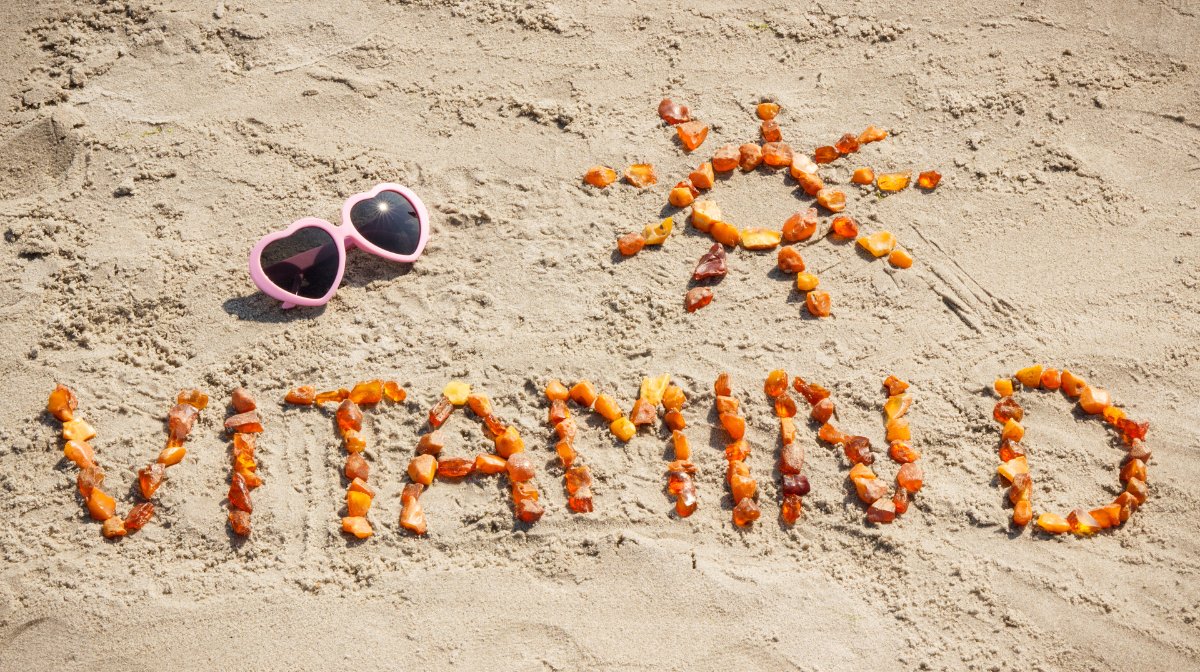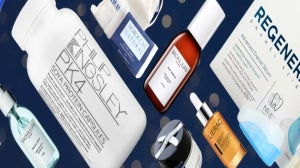
Ready for your glow-up but not quite ready to splash cash on tons of new skin, hair and body products? Yeah, we get it. What if we told you, though, that the key to unlocking your natural glow might be a simple addition to your daily routine? Meet Vitamin D, the ‘sunshine vitamin’ that can work wonders for your skin and hair. From the best vitamin D supplements to vitamin D hair oil, here are all the ways you can easily incorporate this essential nutrient into your beauty regimen.
What is Vitamin D?
Vitamin D is a fat-soluble vitamin that plays a crucial role in maintaining healthy bones, teeth, and muscles. You probably know vitamin D has links to the sun, but let’s break that down. When our skin absorbs sunlight, it naturally produces vitamin D. So, as long as we spend time outdoors, we're covered, right? Unfortunately, that's not always the case. According to a report, a whopping 42% of people have vitamin D deficiency. If you’re working in an office or even wearing sunscreen outdoors, chances are you might not be getting enough vitamin D. So there’s the conundrum: we need vitamin D, but also we need to work andprotect our skin from harmful UV rays. Don’t worry, there’s good news (phew!) Vitamin D can also be obtained through certain foods, supplements and vitamin D-infused products, meaning you can keep yourself topped up no matter how rainy your summer is.
What Are the Benefits of Vitamin D?
The list of Vitamin D's benefits for both body and mind is long and impressive. When we say it helps you glow from the inside out, we’re not kidding. From healthier hair to a happier mindset, here are a few of vitamin D’s benefits.
Radiant Skin: Vitamin D contributes to skin cell growth and repair, helping skin look smoother and boosting radiance. It also has anti-inflammatory properties, which help to reduce redness or irritation (particularly soothing for conditions like eczema and psoriasis).
Strengthened Hair: Vitamin D can be a real game-changer for hair, especially for those struggling with hair loss or brittle strands. Research has shown it can help prevent premature shedding and encourage hair growth by promoting healthy hair follicle cycles.
Mood Booster: Research has shown that vitamin D even benefits your mood (and nothing helps you glow more than a beaming smile, right?).
It’s interesting to note that vitamin D benefits for men and women also differ. For men, vitamin D has been shown to restore deficient testosterone levels and increase muscle strength. Whereas some of the vitamin D benefits for women include improving bone strength (particularly beneficial for menopausal) and regulating hormones.
What Forms Does Vitamin D Come In?
From vitamin D shampoo to supplements, skincare and even make-up, this powerhouse vitamin D can be incorporated into your beauty routine in several ways.
Supplements
Tablets
Arguably the most convenient and consistent way to ensure you’re getting your daily dose of vitamin D, is through taking supplements. Especially during the autumn and winter months, the NHS website recommends all adults take a supplement with 10 micrograms of Vitamin D a day.
Yummy Gummies
If you find swallowing tablets tricky, the best vitamin D supplement for you will be in gummy form. Unlike tablets, gummies don’t require water to wash down, plus (a real added bonus) they taste great. Taking multivitamin gummies is a cost-effective, easy way to incorporate, not only vitamin D, but a range of essential vitamins into your diet. If you have a family, these Bioglan VitaGummies Family Multivitamincan be taken by anyone above the age of 12 and support everything from energy levels to healthy teeth. Specially designed for women to help with things like hormone balance and a healthy metabolism, we also recommend the Bioglan VitaGummies Women's Multivitamin Capsules.
Haircare
Best Products for Frizzy Hair
Vitamin D-infused haircare products can help tame unruly, frizzy hair, leaving it smoother and more manageable. We recommend using the Kérastase Elixir Ultime Le Bain: Sublimating Oil Infused Shampoo followed by the matching fondant. This combination instantly controls frizzy hair for up to 96 hours even in extreme conditions. You can even add a boost of vitamin D through hair oil, we love the Alterna Caviar Anti-Aging Smoothing Anti-Frizz Dry Oil. Lightweight yet hardworking, it’s a handy sidekick for taming flyaways.
Best Hair Masks to Revitalize Your Hair
Hair masks that contain vitamin D are an amazing way to nourish your hair from scalp to strand and restore vibrancy to dull locks. We recommend using Kérastase Elixir Ultime Le Masque: Shine Hair Mask once a week to leave hair feeling strong, soft and shiny.
Who Can Use Vitamin D?
Whether you have dry skin, oily skin, curly hair or straight, incorporating vitamin D into your beauty regimen can help you achieve a more radiant and youthful look. No matter your age or gender, vitamin D is considered safe but if you have any questions about dosage, speak to your healthcare provider.
Check Out Our Ingredient List to Find the Best Products for You
We’ve made it super easy for you to reap the vitamin D benefits and find the perfect products for you. Head to our Vitamin D Product Listing Page to explore our curated selection of vitamin D-enriched products. From supplements to hair care, we have something for everyone.









